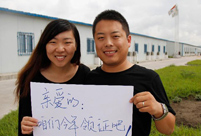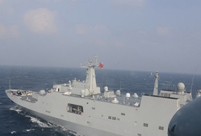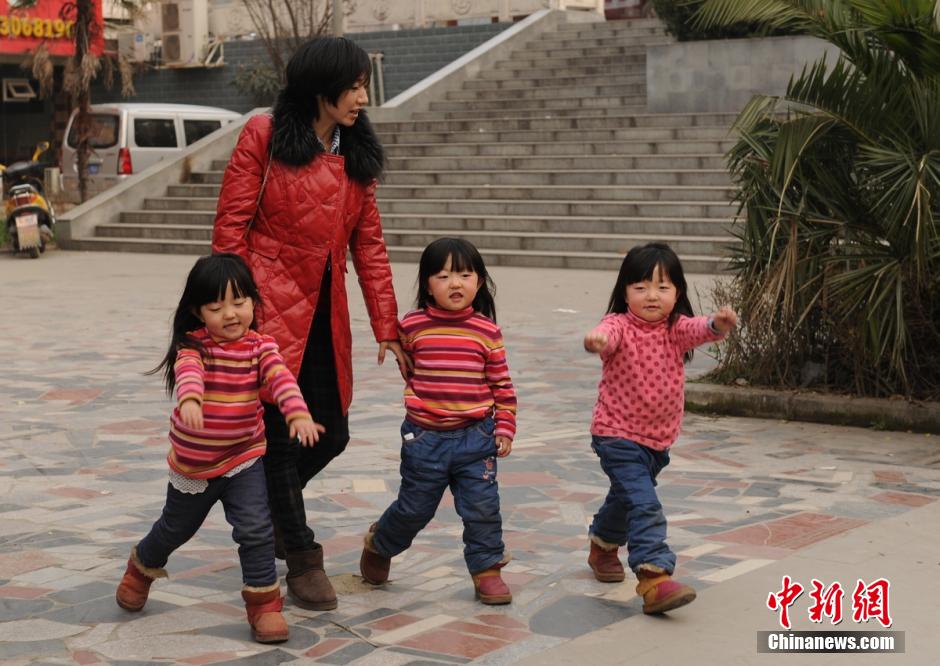 Turnip sculptures amaze tourists in Qingdao
Turnip sculptures amaze tourists in Qingdao Chinese ship formation conducts live fire training in West Pacific
Chinese ship formation conducts live fire training in West Pacific
 China comes in third at figure skating team event
China comes in third at figure skating team event
 China's teenager skater Yan shines at his Olympic debut
China's teenager skater Yan shines at his Olympic debut
 Taiwan-born actor stars on US TV series
Taiwan-born actor stars on US TV series
 Chinese Lunar New Year gift from abroad
Chinese Lunar New Year gift from abroad Chinese champions of Winter Olympic Games
Chinese champions of Winter Olympic Games  Zhang Yimou fined 7.48 mln for over-production
Zhang Yimou fined 7.48 mln for over-production
 Top 10 timeless female Chinese stars
Top 10 timeless female Chinese stars
BEIJING, Feb. 11 -- The international community should compel Japan to abide by the Cairo Declaration and Potsdam Declaration and jointly safeguard the post-war international order, an article carried in Tuesday's China Daily said.
The appeal was made as the Japanese government led by Prime Minister Shinzo Abe is challenging the post-war international order by breaching the international and domestic laws, according to the article signed by Liu Jiangyong, deputy director of the Institute of Modern International Relations, Tsinghua University.
Japan embarked on the road to peaceful development after surrendering to the Allied forces in 1945, accepting the post-war international order established by the Cairo Declaration and Potsdam Declaration, the author wrote.
He quoted the Potsdam Declaration as saying, the forces that misled Japanese people into believing that they would conquer the world must be permanently eliminated and Japanese war criminals punished. And Japan is legally bound to follow the post-war international order that developed from the declaration.
In the Sino-Japanese Joint Statement signed in 1972, the Japanese government said that it "keenly feels the enormous disasters caused by its aggressive war to Chinese people and its responsibilities... (and) expresses profound self-reflections over this, he wrote.
But Japan has violated its commitments and its right-wing forces have been trying to remove the military restraints imposed on Japan by its Constitution and change the international order, according to Liu.
Liu said that the rightist political tendency has become more obvious when Abe was appointed prime minister for the second time in December 2012.
Abe and other politicians visited Yasukuni Shrine honoring 14 Class-A war criminals and denied the Tokyo Trials' verdicts, which Liu said is not only a violation of its commitment to the international community but a breach of its principle to keep politics and religion apart.
And Japan's occupation of Diaoyu Islands violates all established laws and poses a challenge to the world, according to Liu.
Article 8 of the Potsdam Declaration stipulates that "Japanese sovereignty shall be limited to the islands of Honshu, Hokkaido, Kyushu, Shikoku and such minor islands as we determine".
The Cairo Declaration, issued jointly by the United States, Great Britain and China on Dec 1, 1943, says: "Japan shall restore all the territories it has stolen from China, such as Manchuria, Taiwan and Peng-hu islands, to China." The Diaoyu Islands was then a part of Taiwan, Liu wrote.
Liu said, in the 1972 Sino-Japanese Joint Statement, China reiterated its stance that Taiwan is an inalienable part of its territory, and Japan said it fully understood the Chinese government's stance and would comply with Article 8 of the Potsdam Declaration.
He added that in October 1972, Ohira Masayoshi, then Japanese foreign minister and prime minister from 1978 to 1980, told his country's parliament that Japan should return the Diaoyu Islands to China, which he emphasized should be an unchangeable position of the Japanese government.
In order to normalize bilateral relations and sign a friendship treaty, China and Japan decided to shelve the Diaoyu Islands dispute in the 1970s.
However, "the Japanese government recognizes neither the territorial dispute nor the agreement it once reached with China to 'shelve the dispute' over the Diaoyu Islands," Liu said.
As the Abe government is strengthening its defense forces and trying to drag the U.S. into its confrontation with China, Liu called for the whole international community to jointly compel Japan to continue complying with the post-war international order.
 Special Coverage: Sochi Winter Olympic Games
Special Coverage: Sochi Winter Olympic Games  A day of a female high-speed train chief attendant
A day of a female high-speed train chief attendant New Year greetings from Chinese nationals in Africa
New Year greetings from Chinese nationals in Africa PLA navy conducts landing drills in South China Sea
PLA navy conducts landing drills in South China Sea  Blind date fair in Hangzhou
Blind date fair in Hangzhou  Highlights of Chinese New Year celebrations around the world
Highlights of Chinese New Year celebrations around the world  How do the Chinese spend their money during Spring Festival?
How do the Chinese spend their money during Spring Festival? 'Milk Tea' girl hosts Spring Festival gala of universities in U.S.
'Milk Tea' girl hosts Spring Festival gala of universities in U.S.  Brave mother fights cancer, enjoys Spring Festival with her triplets
Brave mother fights cancer, enjoys Spring Festival with her triplets President Xi attends opening ceremony of Sochi Winter Olympics
President Xi attends opening ceremony of Sochi Winter Olympics Highlights of opening ceremony of Sochi Winter Olympic Games
Highlights of opening ceremony of Sochi Winter Olympic Games Snowscape in Chinese New Year
Snowscape in Chinese New Year Interesting horse figures in life
Interesting horse figures in life  Top 20 most beautiful Chinese stars
Top 20 most beautiful Chinese stars  Top 10 Chinese films in 2013
Top 10 Chinese films in 2013Day|Week|Month